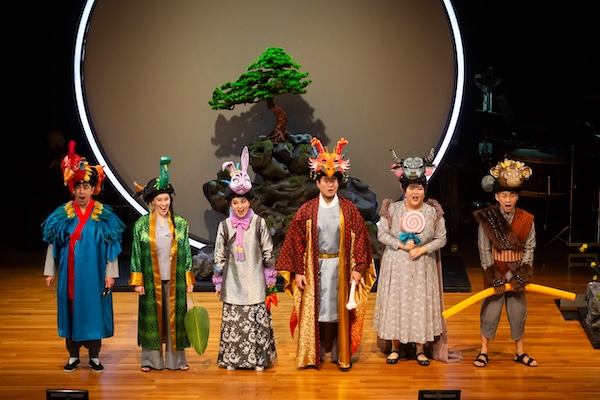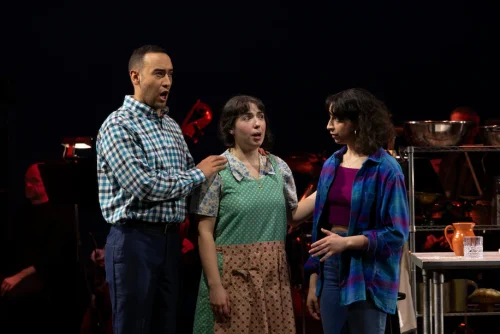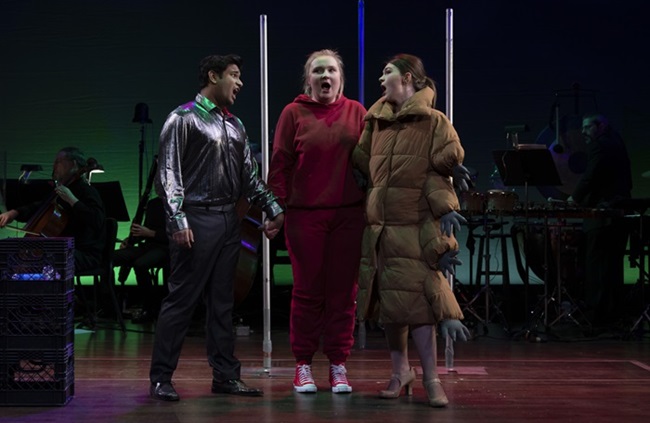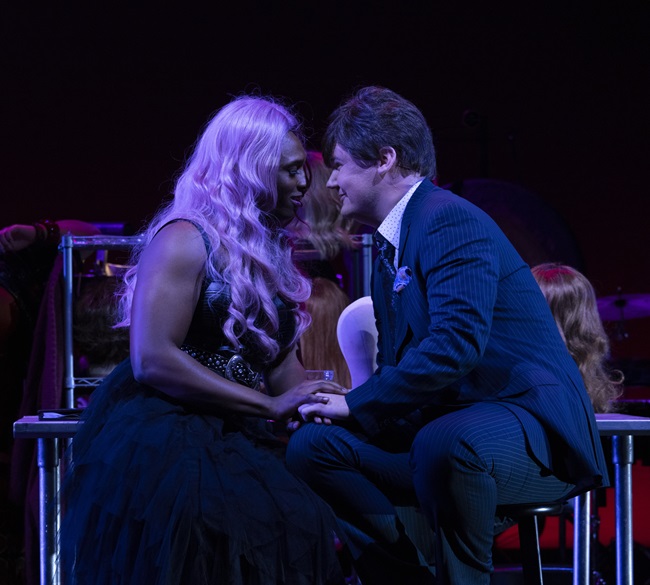By Steven Brown for the Texas Classical Review February 17, 2024

As operagoers mingled in the lobby of Houston’s Asia Society Texas Center, two sturdy male voices suddenly rang out.
“Come in! Come on in,” they sang, heartily and genially. “Take your seats! There’s excitement in the air.”
The voices’ owners, posted near the steps to the center’s theater, were all the more attention-getting thanks to their elaborate, colorful costumes—one dominated by an orange-and-black robe suggesting a tiger’s stripes.
The duo’s invitation launched Friday’s world premiere of The Big Swim by composer Meilina Tsui and librettist Melisa Tien, commissioned by the Asia Society and Houston Grand Opera.
The groups are billing the hour-long work as a family-friendly affair. With its high-spirited score, action-packed staging and vivid costumes, it easily lives up to the claim.
The Big Swim was inspired by a Chinese folk tale that explains why the 12 creatures of the lunar zodiac appear in their specific order: They race down a river to earn their places in the sequence.
Librettist Tien has added a twist of her own. As the race unfolds, the water grows deeper and more dangerous, and the animals save themselves by clinging to one another. Tien’s goal, she explains is a program note, is show the value of banding together in the face of adversity.
“Side by side, competitors no more,” the animals declare at the close. “Side by side in the river of life, we will thrive.”
The twelve animals, portrayed by six singers, make up the opera’s cast.
As the creatures enter, one or two at a time, Tsui’s lively, colorful score helps their personalities come across—from the live-wire rat to the sultry snake. The latter has the most extensive introductory number, replete with sinuous vocal lines.
The competitors quickly launch into conspiracies and comic trash-talking. The rat proposes to the ox that they double up; the pig has to listen to the monkey envision her as a snack of bacon—only to change his mind and suggest sausage.
The characters came and went with vitality galore on opening night.
Mezzo-soprano Sun-Ly Pierce, fresh from playing Suzuki in HGO’s Madama Butterfly, offered the nimblest vocal character-sketching. When she portrayed the snake, her voice sounded deep, plummy and a little sinister; transforming into the sheep, her almost-nasal tones hinted at a bleat.
Seiyoung Kim’s high-wire tenor and bundle-of-energy demeanor made the monkey and rat the most vibrant animals of the contest. No wonder the rat won the race.
Soprano Meigui Zhang’s gleaming tone lent flashiness to the rabbit and horse. Mezzo-soprano Alice Chung brought fullness and warmth to the ox and pig, and she gave a more pensive aura to the ox’s musings about life as an adult.
Baritone Joseph Lim sang with a lustiness that brought out the vigor of the tiger and rooster, and bass Zaikuan Song’s deep-rooted tones put across the dragon’s pride and the dog’s good humor. Lim and Song’s voices also blended neatly in the initial welcome in the lobby.
Tsui’s six-player instrumental group generally chimes in energetically—sometimes with chugging ostinatos—but lightly enough to let the voices come through. During a confrontation between the rabbit and tiger, the music harkens back to an agitated 20th-century atonalism. When the racers navigate the river’s terrors, their voices join in a sonorous ensemble.
With each singer portraying two animals apiece, the costumes play a crucial role in illuminating who is what, and Valérie Thérèse Bart’s ingenious, vibrant designs are one of The Big Swim’skey charms.
The singers are fitted out with intricate reversible headgear, each side of which represents one animal’s face fairly realistically—except, of course, for the scarily fanciful dragon. To complement those, the singers switch between robes and other components that help flesh out their identities, from the pig’s pink smock to the rat’s several-foot-long tail.
The Big Swim’s characters come and go constantly, and stage director Mo Zhou avails of that to keep the stage action bustling.
When the race gets under way, it’s obviously impossible to show all 12 competitors at once, but Zhou and the opera’s creators make up for that by having them zoom across the stage one or two at a time. At the climax, six singers turn out to be plenty to put across the all-for-one message.
All the while, Afsaneh Aayani’s economical set—dominated by a hill surmounted by a single tree—creates an evocative backdrop while leaving plenty of room for the characters’ comings and goings.
The instrumental sextet, led by conductor Eiki Isomura, added its own current of energy. And the cast rode the wave.
The Big Swim will be repeated 2 p.m. Saturday and Sunday at the Asia Society Texas Center. Both performances are sold out. houstongrandopera.org



